The Ultimate Guide to Market Research Screening Surveys using AI
The Ultimate Guide to Market Research Screening Surveys using AI
The Ultimate Guide to Market Research Screening Surveys using AI



In the dynamic landscape of market research, leveraging artificial intelligence (AI) has become indispensable for enhancing the efficiency, accuracy, and depth of insights derived from screening surveys. This comprehensive guide explores how AI transforms the process of conducting screening surveys, from optimizing participant selection to refining data analysis techniques. Whether you're new to AI in market research or looking to enhance your current practices, this guide will equip you with the knowledge and strategies needed to harness AI effectively.
Understanding Market Research Screening Surveys
Market research screening surveys serve as a critical tool for filtering potential participants based on predefined criteria. These surveys are designed to ensure that the selected sample aligns closely with the target audience, thereby maximizing the relevance and reliability of the collected data. Traditionally, conducting screening surveys involved manual processes prone to biases and inefficiencies. However, with advancements in AI technology, organizations can now streamline and enhance every stage of the screening process.
How AI Transforms Screening Surveys
AI brings several transformative benefits to market research screening surveys:
Efficient Participant Selection: AI-powered algorithms analyze large datasets swiftly, automating the screening of participants based on complex criteria such as demographics, behaviors, and preferences.
Enhanced Accuracy: By reducing human error and bias, AI ensures that screening criteria are consistently applied, leading to more reliable participant selection and data quality.
Personalization: AI enables personalized survey experiences by tailoring questions and content based on respondent profiles, thereby increasing engagement and response rates.
Real-time Insights: AI algorithms can analyze survey responses in real-time, providing immediate insights into emerging trends and patterns.
Steps to Implement AI in Screening Surveys
1. Define Objectives and Criteria
Begin by clearly defining the objectives of your screening survey and establishing criteria that participants must meet. AI can help automate the identification of relevant criteria based on historical data and market trends.
2. Select AI-powered Tools
Choose AI-powered survey platforms or tools that align with your research goals. Look for features such as advanced analytics, natural language processing (NLP), and machine learning capabilities to optimize survey design and analysis.
3. Design and Deploy Surveys
Craft survey questionnaires that are precise, unbiased, and aligned with your screening criteria. AI can assist in designing surveys that maximize participant understanding and engagement.
4. Automate Participant Screening
Utilize AI algorithms to automate participant screening based on predefined criteria. This ensures efficiency and consistency in selecting the most suitable respondents for your survey.
5. Analyze and Interpret Data
Apply AI-driven data analysis techniques to interpret survey responses quickly and accurately. Machine learning models can uncover hidden patterns and insights that inform strategic decision-making.
6. Generate Insights and Reports
Synthesize survey findings into actionable insights and comprehensive reports. AI tools can assist in visualizing data through charts, graphs, and dashboards, facilitating easier comprehension and communication of results.
Opportunities of AI-Native Survey Builders in Screening Surveys
AI-native survey builders delivers a transformative advancement in screening surveys, offering unparalleled opportunities to enhance efficiency, accuracy, and insights in market research. Though AI technologies include inherent challenges such as data privacy, bias, and integration complexities, organizations should unlock the full potential of AI-powered survey tools. They streamline survey processes and empower organizations to make data-driven decisions with confidence, driving innovation and competitive advantage in today's digital age.
1. Enhanced Efficiency and Speed
AI-native survey builders automate various aspects of screening surveys, including participant selection, data collection, and analysis. This automation significantly reduces the time required to conduct surveys, enabling quicker turnaround times for insights and decisions.
2. Improved Accuracy and Consistency
AI algorithms ensure consistent application of screening criteria, minimizing human error and bias in participant selection. This leads to more reliable data collection and enhances the overall accuracy of survey results.
3. Personalization and Engagement
AI-powered tools can customize survey experiences based on respondent profiles, preferences, and previous interactions. Personalized surveys increase respondent engagement, leading to higher completion rates and more actionable insights.
4. Advanced Analytics and Insights
AI facilitates advanced analytics techniques such as predictive modeling, sentiment analysis, and clustering. These capabilities uncover deeper insights from survey data, revealing trends, patterns, and correlations that inform strategic decision-making.
5. Cost Efficiency
By automating repetitive tasks and optimizing resource allocation, AI-native survey builders help reduce operational costs associated with traditional survey methods. Organizations can allocate resources more effectively, focusing on strategic initiatives rather than administrative tasks.
6. Scalability and Flexibility
AI-powered survey platforms are scalable, accommodating large volumes of data and diverse survey requirements. They can adapt to changing business needs and market dynamics, supporting flexible survey design and deployment across different channels and geographies.
Challenges of AI-Native Survey Builders in Screening Surveys
1. Data Privacy and Security
AI-native survey builders handle sensitive respondent data, necessitating robust measures for data privacy and security. Organizations must comply with regulations (e.g., GDPR, CCPA) to protect respondent information and ensure ethical use of AI technologies.
2. Integration Complexity
Integrating AI-native survey builders with existing systems and workflows can be challenging. Compatibility issues, technical expertise, and data migration complexities may require dedicated resources and expertise to overcome.
3. Bias in AI Algorithms
AI algorithms may inadvertently perpetuate biases present in training data, impacting participant selection and survey outcomes. Continuous monitoring and algorithmic transparency are essential to mitigate bias and ensure fairness in survey processes.
4. Skill Gap and Training Needs
Effective utilization of AI-native survey builders requires specialized skills in data science, AI technologies, and survey methodology. Organizations may need to invest in training programs to equip staff with the necessary expertise to leverage these tools effectively.
5. Quality of Insights
While AI enhances data analysis capabilities, the quality of insights derived from survey data depends on the accuracy and relevance of input data and the algorithms used. Rigorous validation and interpretation of insights are crucial to derive actionable recommendations.
6. User Experience and Accessibility
AI-powered survey platforms must prioritize user experience to ensure intuitive interfaces, accessibility for diverse respondent demographics, and compatibility across devices and operating systems.
Future Trends in AI-powered Screening Surveys
Looking ahead, the integration of AI in market research is expected to evolve further. Trends such as predictive analytics, sentiment analysis, and AI-driven survey personalization will continue to shape the future of screening surveys. As organizations embrace AI technologies, continuous learning and adaptation will be key to maximizing the potential of AI in generating actionable market insights.
1. Advanced Predictive Analytics
AI algorithms will increasingly incorporate predictive analytics capabilities into screening surveys. These algorithms will not only analyze historical data but also predict future trends and behaviors. By identifying patterns and correlations in data, predictive analytics will enable organizations to anticipate market changes, consumer preferences, and emerging trends more accurately.
2. Natural Language Processing (NLP)
The integration of NLP technology will enhance the sophistication of AI-powered screening surveys. NLP algorithms will enable surveys to understand and analyze open-ended responses, sentiments, and context from participants. This capability will provide deeper insights into consumer attitudes, emotions, and perceptions, enriching the qualitative aspects of survey analysis.
3. Real-time Decision Support
AI-powered screening surveys will offer real-time decision support capabilities. Advanced AI models will analyze survey responses instantaneously, providing actionable insights to decision-makers promptly. This real-time feedback loop will enable organizations to make agile, data-driven decisions and adapt strategies swiftly in response to changing market dynamics.
4. Automated Personalization
AI will facilitate automated personalization of survey experiences based on individual respondent profiles and preferences. Machine learning algorithms will tailor survey questions, content, and delivery methods to maximize respondent engagement and completion rates. This personalized approach will enhance the quality of data collected and improve overall survey effectiveness.
5. Ethical AI and Bias Mitigation
Future AI-powered screening surveys will prioritize ethical considerations and bias mitigation strategies. AI algorithms will undergo rigorous testing and validation to ensure fairness, transparency, and accountability in participant selection and data analysis. Organizations will adopt frameworks and guidelines to address ethical concerns related to data privacy, consent, and algorithmic bias.
6. Integration with IoT and Wearable Devices
The integration of AI with Internet of Things (IoT) devices and wearable technology will expand the scope of screening surveys. IoT sensors and devices will capture real-time behavioral data, enabling more dynamic and context-aware survey designs. This integration will provide holistic insights into consumer behaviors, preferences, and interactions across various touchpoints.
7. Augmented and Virtual Reality (AR/VR)
AR/VR technologies will transform the way AI-powered screening surveys are conducted. Virtual environments and simulations will immerse participants in interactive survey experiences, enhancing engagement and providing more accurate responses. AR/VR will enable researchers to test product concepts, gather feedback on prototypes, and simulate real-world scenarios in controlled environments.
8. Blockchain for Data Security
Blockchain technology will play a crucial role in enhancing data security and integrity in AI-powered screening surveys. Blockchain’s decentralized ledger system will ensure transparent and tamper-proof storage of survey data, protecting participant privacy and mitigating risks associated with data breaches and unauthorized access.
9. Continuous Learning and Adaptation
AI-powered screening surveys will continuously learn and adapt based on ongoing feedback and data insights. Machine learning models will evolve to refine survey methodologies, optimize question design, and improve predictive accuracy over time. This continuous learning loop will drive innovation in survey techniques and enable organizations to stay ahead in competitive markets.
Conclusion: Market Research Screening Surveys using AI
In conclusion, AI-powered screening surveys represent a significant advancement in market research methodologies, offering unprecedented opportunities to enhance efficiency, accuracy, and depth of insights. By leveraging AI technologies effectively—from defining objectives to analyzing survey data—organizations can gain a competitive edge, drive innovation, and make informed decisions that resonate with their target audiences. Embracing AI in screening surveys is not just about adopting technology; it's about transforming how market research is conducted to achieve greater relevance, reliability, and strategic impact in today's rapidly evolving market landscape.
In the dynamic landscape of market research, leveraging artificial intelligence (AI) has become indispensable for enhancing the efficiency, accuracy, and depth of insights derived from screening surveys. This comprehensive guide explores how AI transforms the process of conducting screening surveys, from optimizing participant selection to refining data analysis techniques. Whether you're new to AI in market research or looking to enhance your current practices, this guide will equip you with the knowledge and strategies needed to harness AI effectively.
Understanding Market Research Screening Surveys
Market research screening surveys serve as a critical tool for filtering potential participants based on predefined criteria. These surveys are designed to ensure that the selected sample aligns closely with the target audience, thereby maximizing the relevance and reliability of the collected data. Traditionally, conducting screening surveys involved manual processes prone to biases and inefficiencies. However, with advancements in AI technology, organizations can now streamline and enhance every stage of the screening process.
How AI Transforms Screening Surveys
AI brings several transformative benefits to market research screening surveys:
Efficient Participant Selection: AI-powered algorithms analyze large datasets swiftly, automating the screening of participants based on complex criteria such as demographics, behaviors, and preferences.
Enhanced Accuracy: By reducing human error and bias, AI ensures that screening criteria are consistently applied, leading to more reliable participant selection and data quality.
Personalization: AI enables personalized survey experiences by tailoring questions and content based on respondent profiles, thereby increasing engagement and response rates.
Real-time Insights: AI algorithms can analyze survey responses in real-time, providing immediate insights into emerging trends and patterns.
Steps to Implement AI in Screening Surveys
1. Define Objectives and Criteria
Begin by clearly defining the objectives of your screening survey and establishing criteria that participants must meet. AI can help automate the identification of relevant criteria based on historical data and market trends.
2. Select AI-powered Tools
Choose AI-powered survey platforms or tools that align with your research goals. Look for features such as advanced analytics, natural language processing (NLP), and machine learning capabilities to optimize survey design and analysis.
3. Design and Deploy Surveys
Craft survey questionnaires that are precise, unbiased, and aligned with your screening criteria. AI can assist in designing surveys that maximize participant understanding and engagement.
4. Automate Participant Screening
Utilize AI algorithms to automate participant screening based on predefined criteria. This ensures efficiency and consistency in selecting the most suitable respondents for your survey.
5. Analyze and Interpret Data
Apply AI-driven data analysis techniques to interpret survey responses quickly and accurately. Machine learning models can uncover hidden patterns and insights that inform strategic decision-making.
6. Generate Insights and Reports
Synthesize survey findings into actionable insights and comprehensive reports. AI tools can assist in visualizing data through charts, graphs, and dashboards, facilitating easier comprehension and communication of results.
Opportunities of AI-Native Survey Builders in Screening Surveys
AI-native survey builders delivers a transformative advancement in screening surveys, offering unparalleled opportunities to enhance efficiency, accuracy, and insights in market research. Though AI technologies include inherent challenges such as data privacy, bias, and integration complexities, organizations should unlock the full potential of AI-powered survey tools. They streamline survey processes and empower organizations to make data-driven decisions with confidence, driving innovation and competitive advantage in today's digital age.
1. Enhanced Efficiency and Speed
AI-native survey builders automate various aspects of screening surveys, including participant selection, data collection, and analysis. This automation significantly reduces the time required to conduct surveys, enabling quicker turnaround times for insights and decisions.
2. Improved Accuracy and Consistency
AI algorithms ensure consistent application of screening criteria, minimizing human error and bias in participant selection. This leads to more reliable data collection and enhances the overall accuracy of survey results.
3. Personalization and Engagement
AI-powered tools can customize survey experiences based on respondent profiles, preferences, and previous interactions. Personalized surveys increase respondent engagement, leading to higher completion rates and more actionable insights.
4. Advanced Analytics and Insights
AI facilitates advanced analytics techniques such as predictive modeling, sentiment analysis, and clustering. These capabilities uncover deeper insights from survey data, revealing trends, patterns, and correlations that inform strategic decision-making.
5. Cost Efficiency
By automating repetitive tasks and optimizing resource allocation, AI-native survey builders help reduce operational costs associated with traditional survey methods. Organizations can allocate resources more effectively, focusing on strategic initiatives rather than administrative tasks.
6. Scalability and Flexibility
AI-powered survey platforms are scalable, accommodating large volumes of data and diverse survey requirements. They can adapt to changing business needs and market dynamics, supporting flexible survey design and deployment across different channels and geographies.
Challenges of AI-Native Survey Builders in Screening Surveys
1. Data Privacy and Security
AI-native survey builders handle sensitive respondent data, necessitating robust measures for data privacy and security. Organizations must comply with regulations (e.g., GDPR, CCPA) to protect respondent information and ensure ethical use of AI technologies.
2. Integration Complexity
Integrating AI-native survey builders with existing systems and workflows can be challenging. Compatibility issues, technical expertise, and data migration complexities may require dedicated resources and expertise to overcome.
3. Bias in AI Algorithms
AI algorithms may inadvertently perpetuate biases present in training data, impacting participant selection and survey outcomes. Continuous monitoring and algorithmic transparency are essential to mitigate bias and ensure fairness in survey processes.
4. Skill Gap and Training Needs
Effective utilization of AI-native survey builders requires specialized skills in data science, AI technologies, and survey methodology. Organizations may need to invest in training programs to equip staff with the necessary expertise to leverage these tools effectively.
5. Quality of Insights
While AI enhances data analysis capabilities, the quality of insights derived from survey data depends on the accuracy and relevance of input data and the algorithms used. Rigorous validation and interpretation of insights are crucial to derive actionable recommendations.
6. User Experience and Accessibility
AI-powered survey platforms must prioritize user experience to ensure intuitive interfaces, accessibility for diverse respondent demographics, and compatibility across devices and operating systems.
Future Trends in AI-powered Screening Surveys
Looking ahead, the integration of AI in market research is expected to evolve further. Trends such as predictive analytics, sentiment analysis, and AI-driven survey personalization will continue to shape the future of screening surveys. As organizations embrace AI technologies, continuous learning and adaptation will be key to maximizing the potential of AI in generating actionable market insights.
1. Advanced Predictive Analytics
AI algorithms will increasingly incorporate predictive analytics capabilities into screening surveys. These algorithms will not only analyze historical data but also predict future trends and behaviors. By identifying patterns and correlations in data, predictive analytics will enable organizations to anticipate market changes, consumer preferences, and emerging trends more accurately.
2. Natural Language Processing (NLP)
The integration of NLP technology will enhance the sophistication of AI-powered screening surveys. NLP algorithms will enable surveys to understand and analyze open-ended responses, sentiments, and context from participants. This capability will provide deeper insights into consumer attitudes, emotions, and perceptions, enriching the qualitative aspects of survey analysis.
3. Real-time Decision Support
AI-powered screening surveys will offer real-time decision support capabilities. Advanced AI models will analyze survey responses instantaneously, providing actionable insights to decision-makers promptly. This real-time feedback loop will enable organizations to make agile, data-driven decisions and adapt strategies swiftly in response to changing market dynamics.
4. Automated Personalization
AI will facilitate automated personalization of survey experiences based on individual respondent profiles and preferences. Machine learning algorithms will tailor survey questions, content, and delivery methods to maximize respondent engagement and completion rates. This personalized approach will enhance the quality of data collected and improve overall survey effectiveness.
5. Ethical AI and Bias Mitigation
Future AI-powered screening surveys will prioritize ethical considerations and bias mitigation strategies. AI algorithms will undergo rigorous testing and validation to ensure fairness, transparency, and accountability in participant selection and data analysis. Organizations will adopt frameworks and guidelines to address ethical concerns related to data privacy, consent, and algorithmic bias.
6. Integration with IoT and Wearable Devices
The integration of AI with Internet of Things (IoT) devices and wearable technology will expand the scope of screening surveys. IoT sensors and devices will capture real-time behavioral data, enabling more dynamic and context-aware survey designs. This integration will provide holistic insights into consumer behaviors, preferences, and interactions across various touchpoints.
7. Augmented and Virtual Reality (AR/VR)
AR/VR technologies will transform the way AI-powered screening surveys are conducted. Virtual environments and simulations will immerse participants in interactive survey experiences, enhancing engagement and providing more accurate responses. AR/VR will enable researchers to test product concepts, gather feedback on prototypes, and simulate real-world scenarios in controlled environments.
8. Blockchain for Data Security
Blockchain technology will play a crucial role in enhancing data security and integrity in AI-powered screening surveys. Blockchain’s decentralized ledger system will ensure transparent and tamper-proof storage of survey data, protecting participant privacy and mitigating risks associated with data breaches and unauthorized access.
9. Continuous Learning and Adaptation
AI-powered screening surveys will continuously learn and adapt based on ongoing feedback and data insights. Machine learning models will evolve to refine survey methodologies, optimize question design, and improve predictive accuracy over time. This continuous learning loop will drive innovation in survey techniques and enable organizations to stay ahead in competitive markets.
Conclusion: Market Research Screening Surveys using AI
In conclusion, AI-powered screening surveys represent a significant advancement in market research methodologies, offering unprecedented opportunities to enhance efficiency, accuracy, and depth of insights. By leveraging AI technologies effectively—from defining objectives to analyzing survey data—organizations can gain a competitive edge, drive innovation, and make informed decisions that resonate with their target audiences. Embracing AI in screening surveys is not just about adopting technology; it's about transforming how market research is conducted to achieve greater relevance, reliability, and strategic impact in today's rapidly evolving market landscape.
In the dynamic landscape of market research, leveraging artificial intelligence (AI) has become indispensable for enhancing the efficiency, accuracy, and depth of insights derived from screening surveys. This comprehensive guide explores how AI transforms the process of conducting screening surveys, from optimizing participant selection to refining data analysis techniques. Whether you're new to AI in market research or looking to enhance your current practices, this guide will equip you with the knowledge and strategies needed to harness AI effectively.
Understanding Market Research Screening Surveys
Market research screening surveys serve as a critical tool for filtering potential participants based on predefined criteria. These surveys are designed to ensure that the selected sample aligns closely with the target audience, thereby maximizing the relevance and reliability of the collected data. Traditionally, conducting screening surveys involved manual processes prone to biases and inefficiencies. However, with advancements in AI technology, organizations can now streamline and enhance every stage of the screening process.
How AI Transforms Screening Surveys
AI brings several transformative benefits to market research screening surveys:
Efficient Participant Selection: AI-powered algorithms analyze large datasets swiftly, automating the screening of participants based on complex criteria such as demographics, behaviors, and preferences.
Enhanced Accuracy: By reducing human error and bias, AI ensures that screening criteria are consistently applied, leading to more reliable participant selection and data quality.
Personalization: AI enables personalized survey experiences by tailoring questions and content based on respondent profiles, thereby increasing engagement and response rates.
Real-time Insights: AI algorithms can analyze survey responses in real-time, providing immediate insights into emerging trends and patterns.
Steps to Implement AI in Screening Surveys
1. Define Objectives and Criteria
Begin by clearly defining the objectives of your screening survey and establishing criteria that participants must meet. AI can help automate the identification of relevant criteria based on historical data and market trends.
2. Select AI-powered Tools
Choose AI-powered survey platforms or tools that align with your research goals. Look for features such as advanced analytics, natural language processing (NLP), and machine learning capabilities to optimize survey design and analysis.
3. Design and Deploy Surveys
Craft survey questionnaires that are precise, unbiased, and aligned with your screening criteria. AI can assist in designing surveys that maximize participant understanding and engagement.
4. Automate Participant Screening
Utilize AI algorithms to automate participant screening based on predefined criteria. This ensures efficiency and consistency in selecting the most suitable respondents for your survey.
5. Analyze and Interpret Data
Apply AI-driven data analysis techniques to interpret survey responses quickly and accurately. Machine learning models can uncover hidden patterns and insights that inform strategic decision-making.
6. Generate Insights and Reports
Synthesize survey findings into actionable insights and comprehensive reports. AI tools can assist in visualizing data through charts, graphs, and dashboards, facilitating easier comprehension and communication of results.
Opportunities of AI-Native Survey Builders in Screening Surveys
AI-native survey builders delivers a transformative advancement in screening surveys, offering unparalleled opportunities to enhance efficiency, accuracy, and insights in market research. Though AI technologies include inherent challenges such as data privacy, bias, and integration complexities, organizations should unlock the full potential of AI-powered survey tools. They streamline survey processes and empower organizations to make data-driven decisions with confidence, driving innovation and competitive advantage in today's digital age.
1. Enhanced Efficiency and Speed
AI-native survey builders automate various aspects of screening surveys, including participant selection, data collection, and analysis. This automation significantly reduces the time required to conduct surveys, enabling quicker turnaround times for insights and decisions.
2. Improved Accuracy and Consistency
AI algorithms ensure consistent application of screening criteria, minimizing human error and bias in participant selection. This leads to more reliable data collection and enhances the overall accuracy of survey results.
3. Personalization and Engagement
AI-powered tools can customize survey experiences based on respondent profiles, preferences, and previous interactions. Personalized surveys increase respondent engagement, leading to higher completion rates and more actionable insights.
4. Advanced Analytics and Insights
AI facilitates advanced analytics techniques such as predictive modeling, sentiment analysis, and clustering. These capabilities uncover deeper insights from survey data, revealing trends, patterns, and correlations that inform strategic decision-making.
5. Cost Efficiency
By automating repetitive tasks and optimizing resource allocation, AI-native survey builders help reduce operational costs associated with traditional survey methods. Organizations can allocate resources more effectively, focusing on strategic initiatives rather than administrative tasks.
6. Scalability and Flexibility
AI-powered survey platforms are scalable, accommodating large volumes of data and diverse survey requirements. They can adapt to changing business needs and market dynamics, supporting flexible survey design and deployment across different channels and geographies.
Challenges of AI-Native Survey Builders in Screening Surveys
1. Data Privacy and Security
AI-native survey builders handle sensitive respondent data, necessitating robust measures for data privacy and security. Organizations must comply with regulations (e.g., GDPR, CCPA) to protect respondent information and ensure ethical use of AI technologies.
2. Integration Complexity
Integrating AI-native survey builders with existing systems and workflows can be challenging. Compatibility issues, technical expertise, and data migration complexities may require dedicated resources and expertise to overcome.
3. Bias in AI Algorithms
AI algorithms may inadvertently perpetuate biases present in training data, impacting participant selection and survey outcomes. Continuous monitoring and algorithmic transparency are essential to mitigate bias and ensure fairness in survey processes.
4. Skill Gap and Training Needs
Effective utilization of AI-native survey builders requires specialized skills in data science, AI technologies, and survey methodology. Organizations may need to invest in training programs to equip staff with the necessary expertise to leverage these tools effectively.
5. Quality of Insights
While AI enhances data analysis capabilities, the quality of insights derived from survey data depends on the accuracy and relevance of input data and the algorithms used. Rigorous validation and interpretation of insights are crucial to derive actionable recommendations.
6. User Experience and Accessibility
AI-powered survey platforms must prioritize user experience to ensure intuitive interfaces, accessibility for diverse respondent demographics, and compatibility across devices and operating systems.
Future Trends in AI-powered Screening Surveys
Looking ahead, the integration of AI in market research is expected to evolve further. Trends such as predictive analytics, sentiment analysis, and AI-driven survey personalization will continue to shape the future of screening surveys. As organizations embrace AI technologies, continuous learning and adaptation will be key to maximizing the potential of AI in generating actionable market insights.
1. Advanced Predictive Analytics
AI algorithms will increasingly incorporate predictive analytics capabilities into screening surveys. These algorithms will not only analyze historical data but also predict future trends and behaviors. By identifying patterns and correlations in data, predictive analytics will enable organizations to anticipate market changes, consumer preferences, and emerging trends more accurately.
2. Natural Language Processing (NLP)
The integration of NLP technology will enhance the sophistication of AI-powered screening surveys. NLP algorithms will enable surveys to understand and analyze open-ended responses, sentiments, and context from participants. This capability will provide deeper insights into consumer attitudes, emotions, and perceptions, enriching the qualitative aspects of survey analysis.
3. Real-time Decision Support
AI-powered screening surveys will offer real-time decision support capabilities. Advanced AI models will analyze survey responses instantaneously, providing actionable insights to decision-makers promptly. This real-time feedback loop will enable organizations to make agile, data-driven decisions and adapt strategies swiftly in response to changing market dynamics.
4. Automated Personalization
AI will facilitate automated personalization of survey experiences based on individual respondent profiles and preferences. Machine learning algorithms will tailor survey questions, content, and delivery methods to maximize respondent engagement and completion rates. This personalized approach will enhance the quality of data collected and improve overall survey effectiveness.
5. Ethical AI and Bias Mitigation
Future AI-powered screening surveys will prioritize ethical considerations and bias mitigation strategies. AI algorithms will undergo rigorous testing and validation to ensure fairness, transparency, and accountability in participant selection and data analysis. Organizations will adopt frameworks and guidelines to address ethical concerns related to data privacy, consent, and algorithmic bias.
6. Integration with IoT and Wearable Devices
The integration of AI with Internet of Things (IoT) devices and wearable technology will expand the scope of screening surveys. IoT sensors and devices will capture real-time behavioral data, enabling more dynamic and context-aware survey designs. This integration will provide holistic insights into consumer behaviors, preferences, and interactions across various touchpoints.
7. Augmented and Virtual Reality (AR/VR)
AR/VR technologies will transform the way AI-powered screening surveys are conducted. Virtual environments and simulations will immerse participants in interactive survey experiences, enhancing engagement and providing more accurate responses. AR/VR will enable researchers to test product concepts, gather feedback on prototypes, and simulate real-world scenarios in controlled environments.
8. Blockchain for Data Security
Blockchain technology will play a crucial role in enhancing data security and integrity in AI-powered screening surveys. Blockchain’s decentralized ledger system will ensure transparent and tamper-proof storage of survey data, protecting participant privacy and mitigating risks associated with data breaches and unauthorized access.
9. Continuous Learning and Adaptation
AI-powered screening surveys will continuously learn and adapt based on ongoing feedback and data insights. Machine learning models will evolve to refine survey methodologies, optimize question design, and improve predictive accuracy over time. This continuous learning loop will drive innovation in survey techniques and enable organizations to stay ahead in competitive markets.
Conclusion: Market Research Screening Surveys using AI
In conclusion, AI-powered screening surveys represent a significant advancement in market research methodologies, offering unprecedented opportunities to enhance efficiency, accuracy, and depth of insights. By leveraging AI technologies effectively—from defining objectives to analyzing survey data—organizations can gain a competitive edge, drive innovation, and make informed decisions that resonate with their target audiences. Embracing AI in screening surveys is not just about adopting technology; it's about transforming how market research is conducted to achieve greater relevance, reliability, and strategic impact in today's rapidly evolving market landscape.
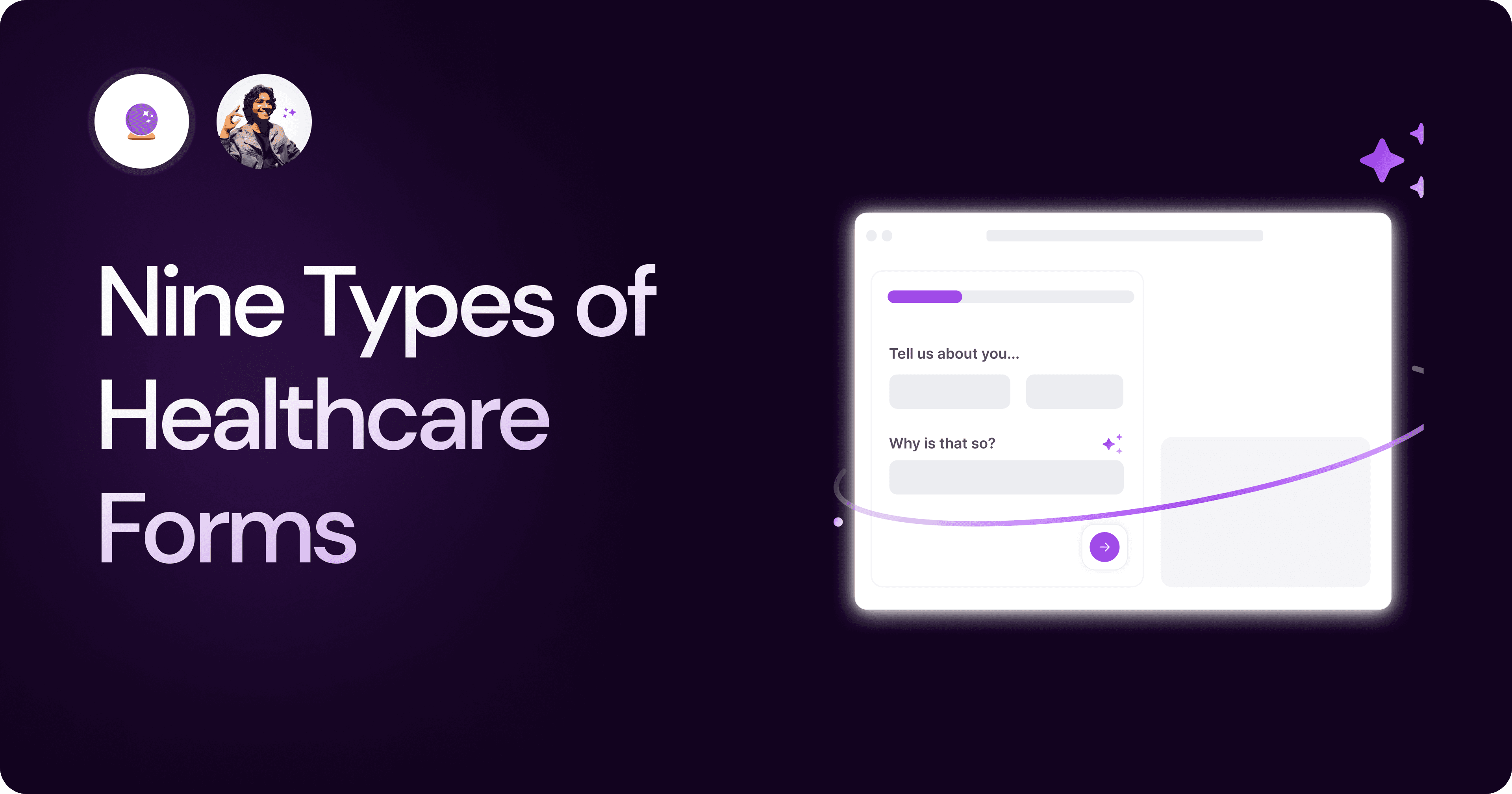
Nine Types of Healthcare and Medical Forms.
Medical forms are a must-have for any healthcare business or practitioner. Learn about the different kinds of medical and healthcare forms.
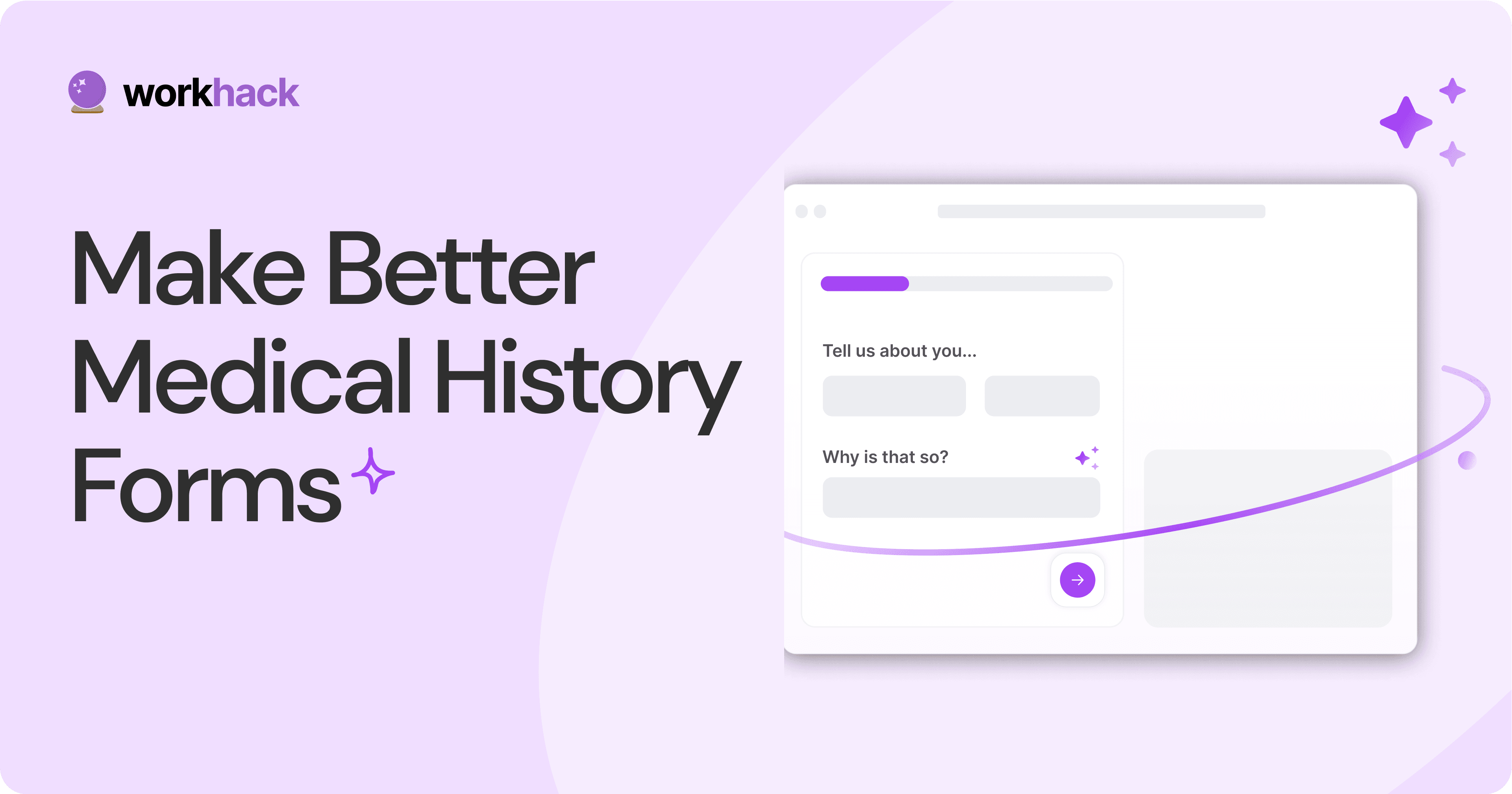
4 Tips for Better Medical History Forms.
Medical history forms are central to patient care, onboarding, and medical administration records. Learn how to make them easier to fill.
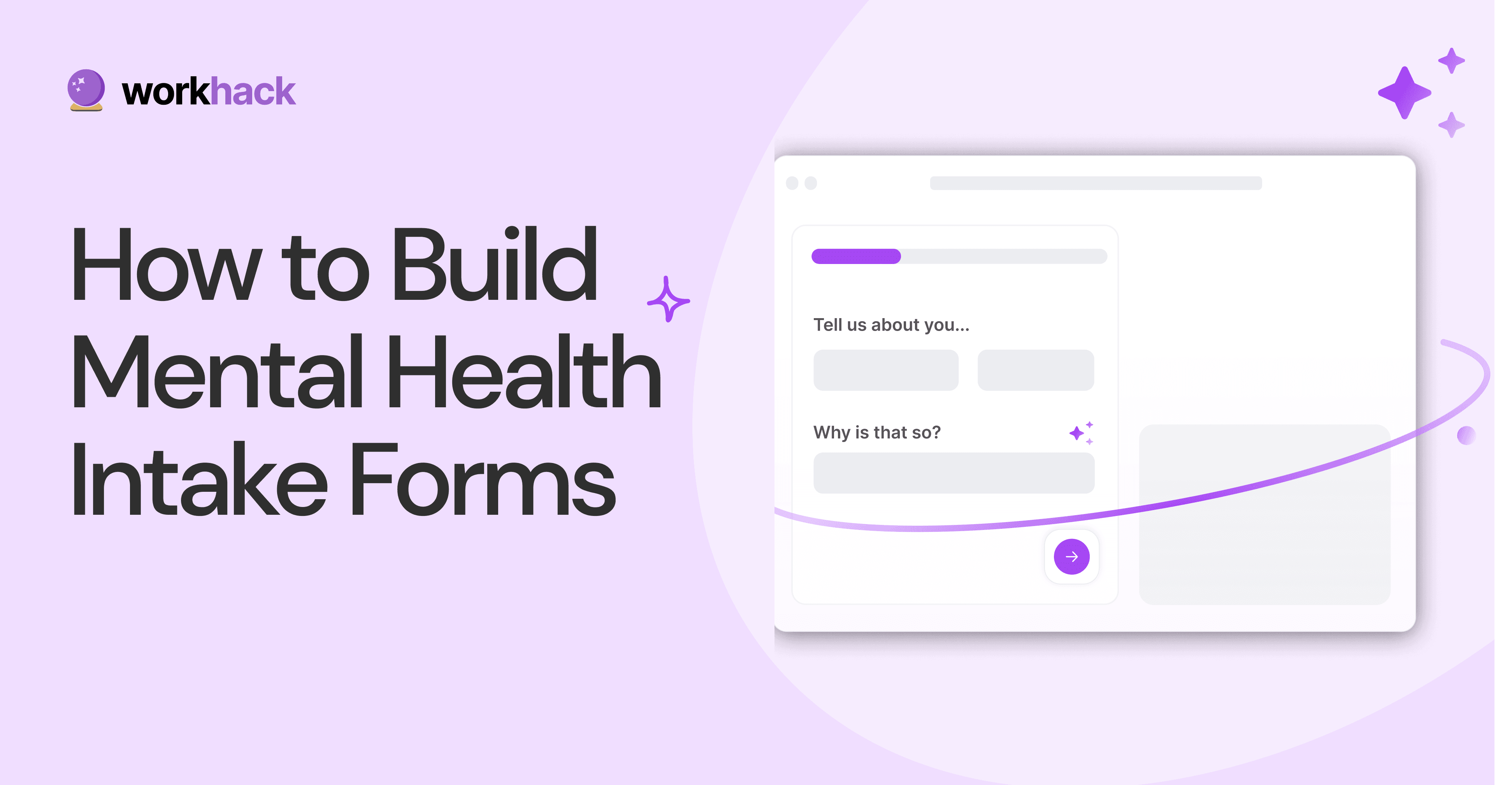
How to Build Mental Health Intake Forms?
Mental health intake forms are not like patient intake forms. Mental health intake forms deal with far more sensitive data and have specific design methods.
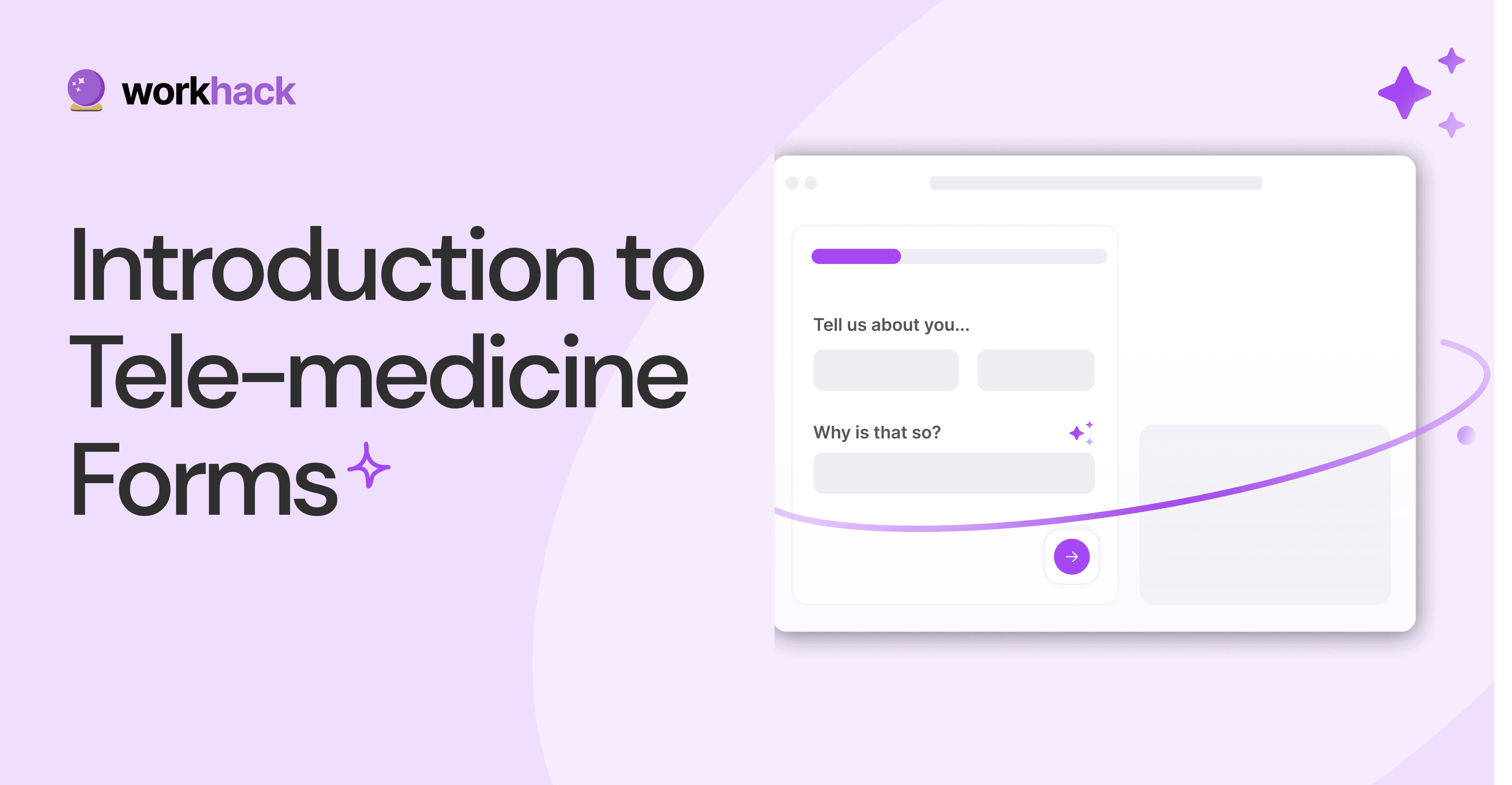
What, Why and How of Telemedicine Forms.
Telemedicine is on the rise and with different form builders out there, which one best suits your needs as a healthcare services provider?
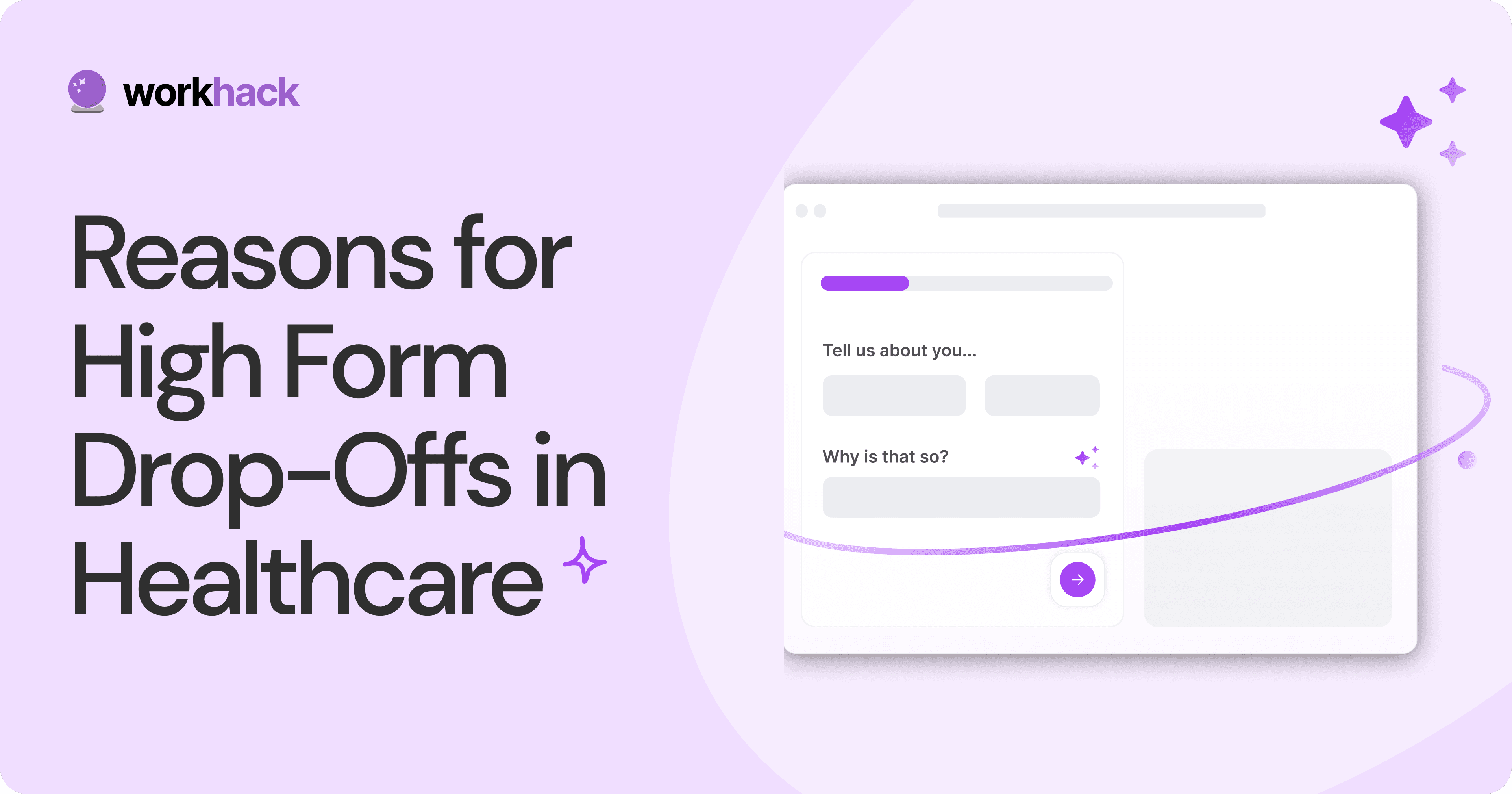
3 Reasons for Major Drop-Offs in Medical Forms.
No matter which healthcare form we pick, there are major drop-off reasons. We shall dive into the top 3 and learn how to resolve them in your next form.
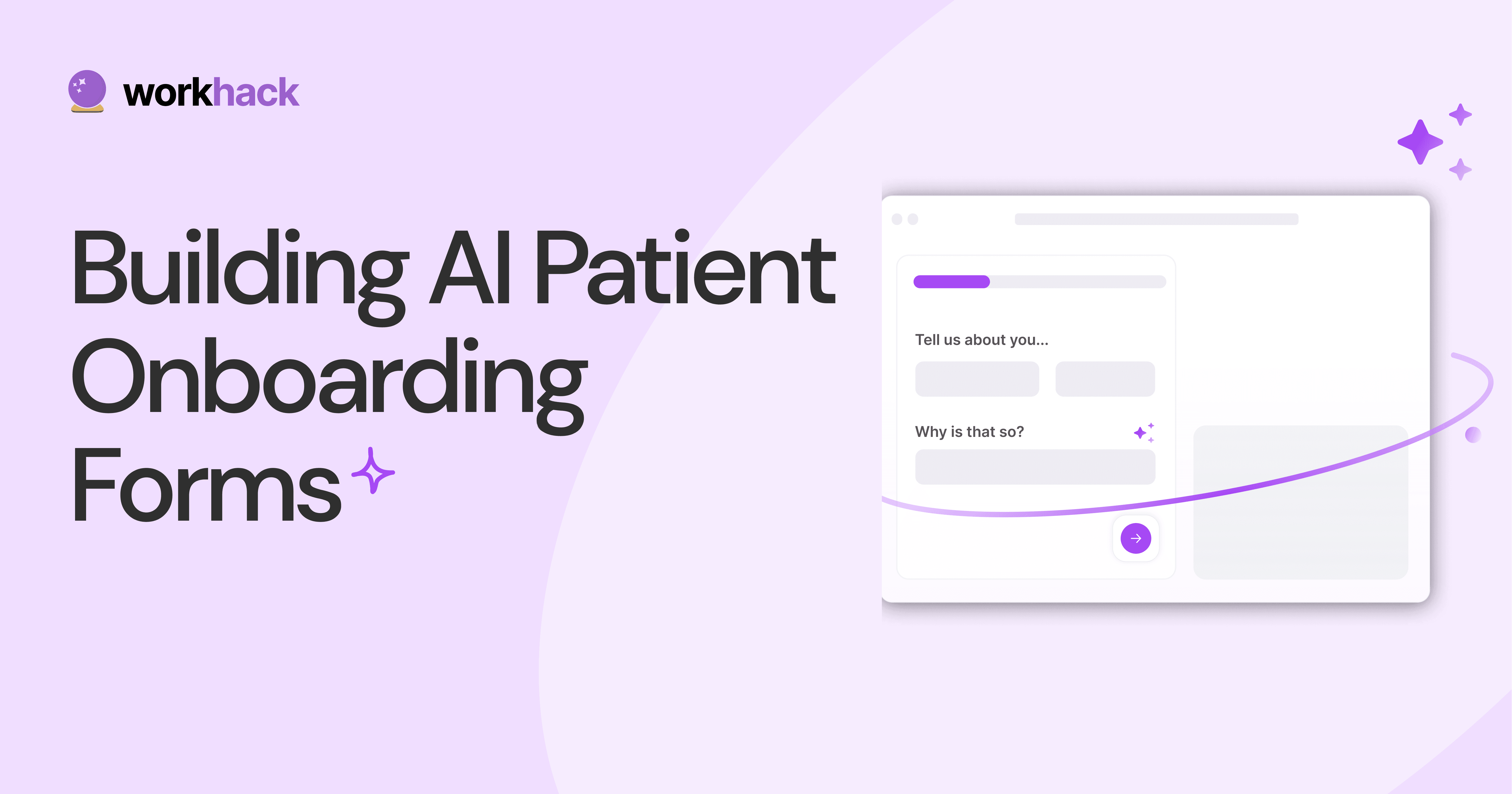
Patient Onboarding Forms - From Click to Clinic.
Patient onboarding forms are the first touchpoint for patients; getting this right for higher conversion rates is a must-have. Learn how to perfect them now.
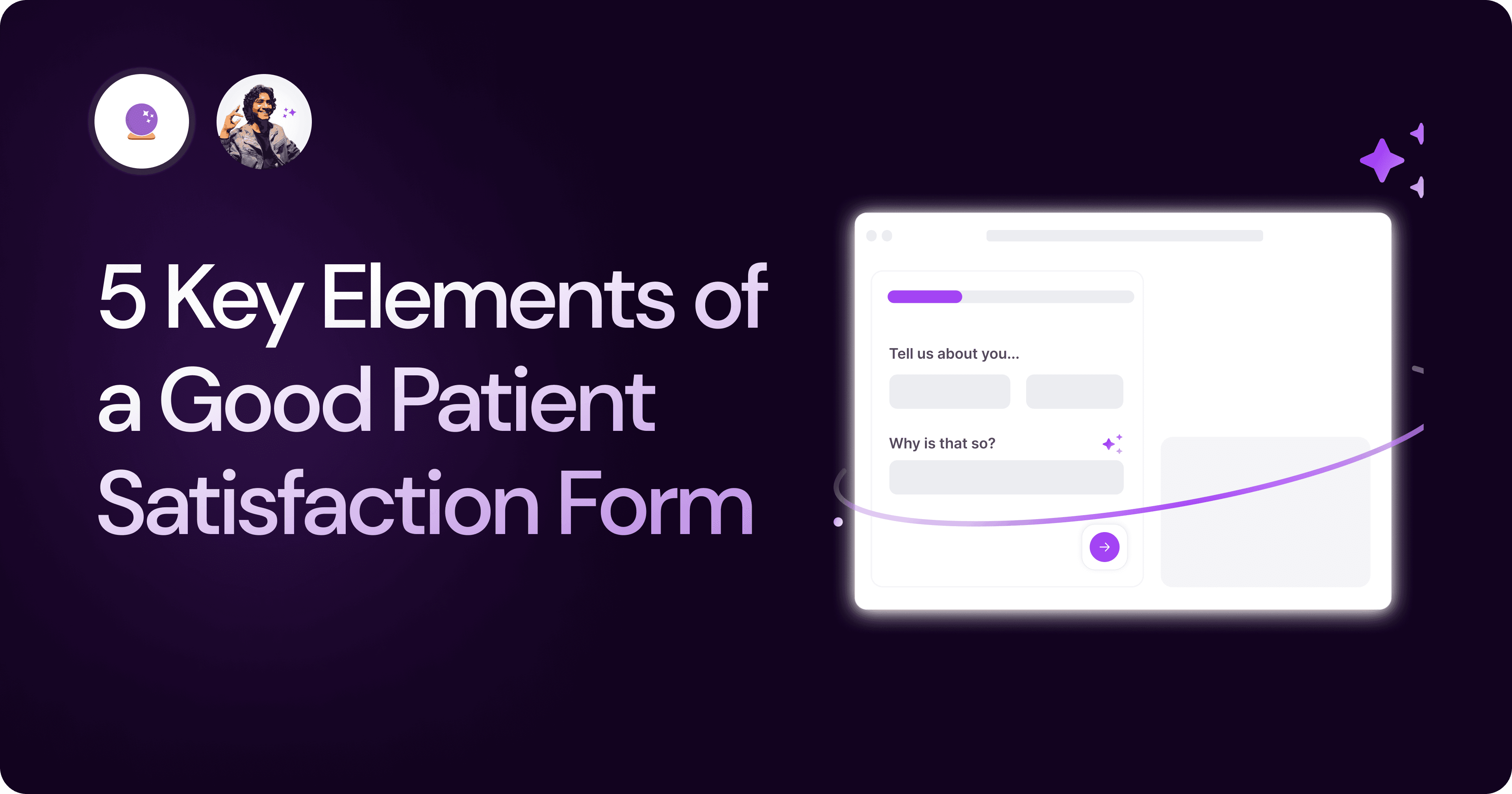
5 Key Parts of a Good Patient Satisfaction Form.
The goal of patient satisfaction surveys is to course-correct the services of a healthcare provider. Patient feedback leads to a culture of patient-centric care.
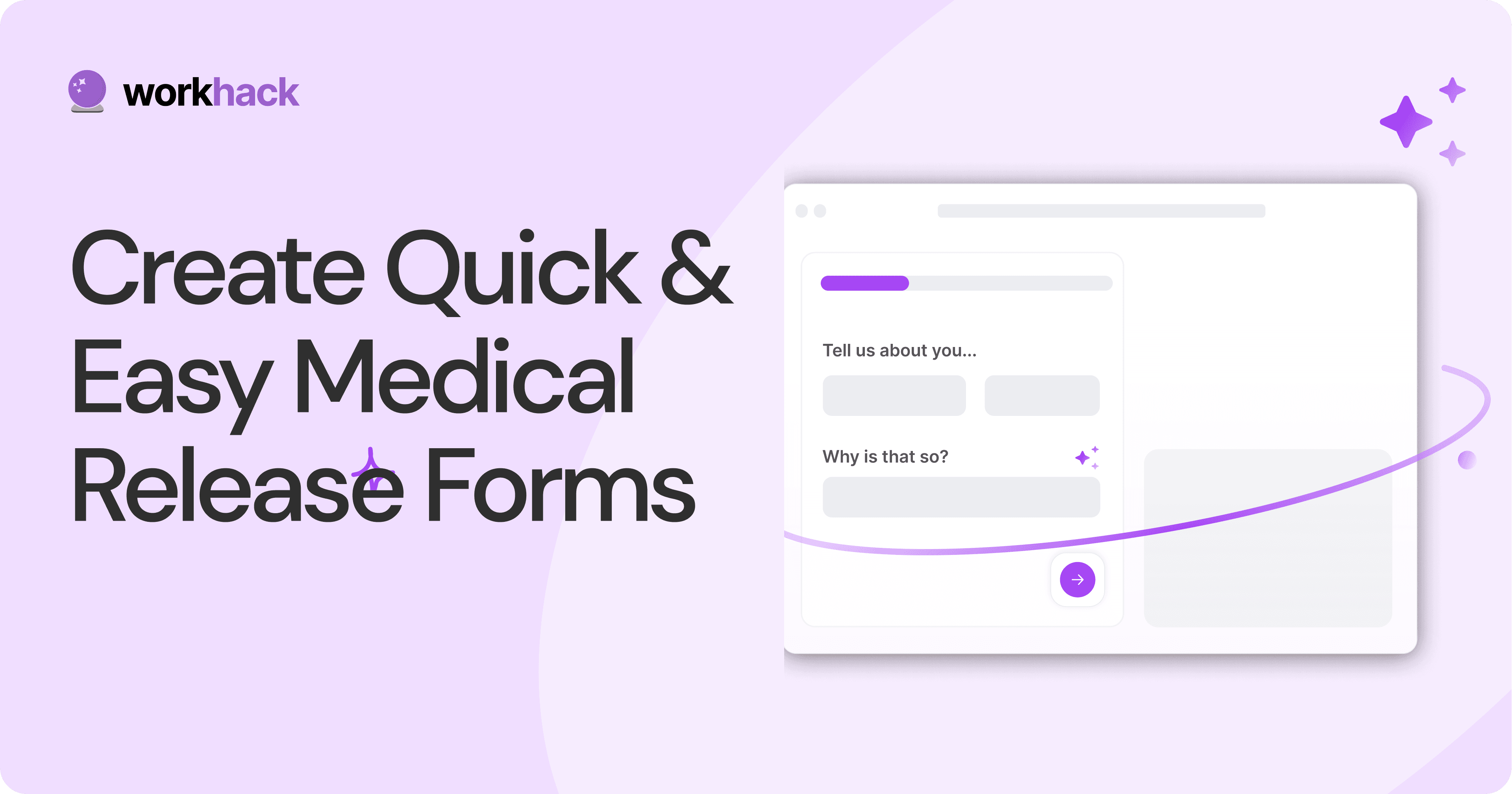
Build Quick and Easy Medical Release Forms.
Every HIPAA-compliant healthcare provider comes across medical release forms that involve details from medical history forms. Can they be shipped fast? Yes.

Nine Types of Healthcare and Medical Forms.
Medical forms are a must-have for any healthcare business or practitioner. Learn about the different kinds of medical and healthcare forms.

4 Tips for Better Medical History Forms.
Medical history forms are central to patient care, onboarding, and medical administration records. Learn how to make them easier to fill.

How to Build Mental Health Intake Forms?
Mental health intake forms are not like patient intake forms. Mental health intake forms deal with far more sensitive data and have specific design methods.

What, Why and How of Telemedicine Forms.
Telemedicine is on the rise and with different form builders out there, which one best suits your needs as a healthcare services provider?

3 Reasons for Major Drop-Offs in Medical Forms.
No matter which healthcare form we pick, there are major drop-off reasons. We shall dive into the top 3 and learn how to resolve them in your next form.

Patient Onboarding Forms - From Click to Clinic.
Patient onboarding forms are the first touchpoint for patients; getting this right for higher conversion rates is a must-have. Learn how to perfect them now.

5 Key Parts of a Good Patient Satisfaction Form.
The goal of patient satisfaction surveys is to course-correct the services of a healthcare provider. Patient feedback leads to a culture of patient-centric care.

Build Quick and Easy Medical Release Forms.
Every HIPAA-compliant healthcare provider comes across medical release forms that involve details from medical history forms. Can they be shipped fast? Yes.

Nine Types of Healthcare and Medical Forms.
Medical forms are a must-have for any healthcare business or practitioner. Learn about the different kinds of medical and healthcare forms.

4 Tips for Better Medical History Forms.
Medical history forms are central to patient care, onboarding, and medical administration records. Learn how to make them easier to fill.

How to Build Mental Health Intake Forms?
Mental health intake forms are not like patient intake forms. Mental health intake forms deal with far more sensitive data and have specific design methods.

What, Why and How of Telemedicine Forms.
Telemedicine is on the rise and with different form builders out there, which one best suits your needs as a healthcare services provider?

3 Reasons for Major Drop-Offs in Medical Forms.
No matter which healthcare form we pick, there are major drop-off reasons. We shall dive into the top 3 and learn how to resolve them in your next form.

Patient Onboarding Forms - From Click to Clinic.
Patient onboarding forms are the first touchpoint for patients; getting this right for higher conversion rates is a must-have. Learn how to perfect them now.

5 Key Parts of a Good Patient Satisfaction Form.
The goal of patient satisfaction surveys is to course-correct the services of a healthcare provider. Patient feedback leads to a culture of patient-centric care.

Build Quick and Easy Medical Release Forms.
Every HIPAA-compliant healthcare provider comes across medical release forms that involve details from medical history forms. Can they be shipped fast? Yes.

Nine Types of Healthcare and Medical Forms.
Medical forms are a must-have for any healthcare business or practitioner. Learn about the different kinds of medical and healthcare forms.

4 Tips for Better Medical History Forms.
Medical history forms are central to patient care, onboarding, and medical administration records. Learn how to make them easier to fill.

How to Build Mental Health Intake Forms?
Mental health intake forms are not like patient intake forms. Mental health intake forms deal with far more sensitive data and have specific design methods.

What, Why and How of Telemedicine Forms.
Telemedicine is on the rise and with different form builders out there, which one best suits your needs as a healthcare services provider?

3 Reasons for Major Drop-Offs in Medical Forms.
No matter which healthcare form we pick, there are major drop-off reasons. We shall dive into the top 3 and learn how to resolve them in your next form.

Patient Onboarding Forms - From Click to Clinic.
Patient onboarding forms are the first touchpoint for patients; getting this right for higher conversion rates is a must-have. Learn how to perfect them now.

5 Key Parts of a Good Patient Satisfaction Form.
The goal of patient satisfaction surveys is to course-correct the services of a healthcare provider. Patient feedback leads to a culture of patient-centric care.

Build Quick and Easy Medical Release Forms.
Every HIPAA-compliant healthcare provider comes across medical release forms that involve details from medical history forms. Can they be shipped fast? Yes.
Subscribe to stay updated.
Subscribe to stay updated.
Subscribe to stay updated.
HC

HC

HC

HC

70+ people from across industries read our emails.
HC

HC

70+ people from across industries read our emails.
HC

HC

HC

70+ people from across industries read our emails.




Bangalore, India / San Francisco, US
WorkHack Inc. 2023
Bangalore, India
San Francisco, US
WorkHack Inc. 2023
WorkHack Inc. 2023
Bangalore, India / San Francisco, US
WorkHack Inc. 2023
Bangalore, India / San Francisco, US



